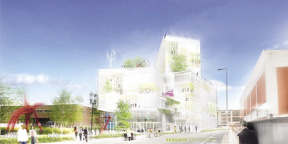Behnisch Architekten, internationally renowned architecture firm and sustainability experts, unveiled the first image of the EpiCenter Expansion, a new multi-use building for Artists For Humanity (AFH). AFH is a not-for-profit organization that bridges economic, racial and social divisions by providing under-resourced youth with the keys to self-sufficiency through paid employment in art and design. The expansion is slated to be the largest Energy Positive (E+) commercial building in New England, perhaps the East Coast, because it will generate more energy than it uses. The building opens in November 2016.
The expansion represents a joint commitment by Behnisch Architekten and AFH to build a pioneering, sustainable building that gives energy back to the grid. Behnisch Architekten is a global advocate for environmental responsibility. The firm gained international acclaim for its groundbreaking Genzyme Center in Cambridge, that demonstrated how sustainable design can also be good design. AFH's existing EpiCenter, completed in 2004, was the city's first LEED Platinum building.
The new multi-story facility will rise in the city's Innovation District on a former parking lot adjacent to the existing EpiCenter that was donated by neighbor Procter & Gamble. The expansion adds 63,500 s/f for ongoing and future programming to the existing 23,500 s/f building for a total of 87,000 s/f. The larger facility will accommodate more youth artists, expanded galleries, a community studio, and a maker's studio that will enhance audience engagement. A retail store and a neighborhood café will open onto a new 1.5 acre public park. The existing space will be updated.
AFH's executive/artistic director Susan Rodgerson said that AFH chose Behnisch because "the goals of our organization and their experience align so well. This building cements our organizational sustainability and creates a flagship building for our growing programs. We were impressed by Behnisch Architekten's experience in sustainability, and they also bring a fresh eye to design. We're excited to embark on this project together."
Shortly after completing the EpiCenter, AFH reached space capacity, and current youth demand for its program exceeds available space. When the new EpiCenter is finished, it will have three times more space, expanding AFH's capabilities and visibility in the Innovation District, as well as greater Boston.
The building's innovative façade will optimize daylighting, maximize thermal performance, and contribute to the energy production that is required of an Energy Positive building. Large loft-like floors will allow flexibility so the AFH can accommodate diverse programs as it grows. The building's height and transparency will also allow the community and passersby to see the work and activities taking place within.
Robert Matthew Noblett, AIA, NCARB, partner-in-charge of Behnisch Architekten's Boston office said, "The AFH project is a unique building type with a distinct social mission. This is where our firm excels. It is an opportunity for us to point well-designed architecture with an overt environmental agenda at a youthful audience that may not often be exposed to it. We're excited that AFH is willing to explore building concepts that push the boundaries of what a sustainable urban building can be, and to create a building that is an integral part of their overall educational mission."
The project team includes Transsolar (climate engineer), Buro Happold (MEP engineer), and Knippers Helbig (structural engineer).
Founded in 1989, Behnisch Architekten is an award-winning, internationally recognized cross-disciplinary architecture firm. From the beginning, the social dimension of architecture has been a fundamental aspect of the firm's design philosophy. Behnisch Architekten's search for innovative and sustainable solutions while making optimum use of natural resources has produced a rich variety of buildings, each of which responds to specific user requirements and site conditions. Recent and ongoing projects include John and Frances Angelos Law Center at the University of Baltimore, Harvard University Allston Science Complex, the World Intellectual Property Organization (WIPO) administrative building in Geneva, and the City of Santa Monica Parking Structure #6. Behnisch Architekten has offices in Stuttgart and Munich, Germany; and in Boston. The firm's projects are widely published and exhibited worldwide, and its staff members are actively engaged in architectural education and are regular lecturers at top universities and conferences.
Since 1991, Artists For Humanity has empowered and employed Boston teens in an intensive program of arts, creativity and enterprise. AFH partners youth with professional artists/designers to design, create and sell art products. With fully equipped, staffed studios in painting, industrial design, screen-printing, design, photography, and video, youth and mentors collaborate on creative projects, many specifically commissioned by clients. In the process, young artists develop entrepreneurial skills, and introduce audiences to their voice, vision and virtuosity. Artists For Humanity apprentices have produced fine art and creative products for Boston›s largest firms and organizations. The Artists For Humanity model is being disseminated internationally to organizations that utilize this framework of responsibility, respect, and positive relationships to empower young people in their communities.
Tags:
Behnisch Architekten unveils design of EpiCenter Expansion - one of the largest Energy Positive buildings in New England
December 04, 2014 - Owners Developers & Managers
 (1).png)








